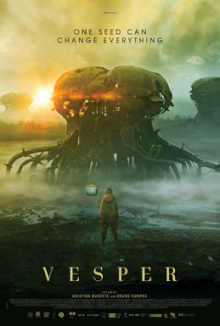This is an English language science-fiction film from Lithuania and I so love how different it is from work produced in the west. It’s set in a post-apocalyptic world which is normal enough except that biotechnology dominates and all that is left of civilization depends on it. The plot is mostly solid with good acting by its mainly British cast and the visuals of weird synthetic organisms are appropriately otherworldly and fantastic. My only complaint is that the setting is very grim, yet the main heroine is way too hopeful and nice a person for what she must have lived through.
In a future where out of control biotechnology has ruined the natural ecosystem, the elite survive in enclaves called Citadels. They use synthetic humans called Jugs as slaves and control the food supply by selling genetically locked seeds. Vesper is a young girl who survives on her own with her paralyzed father Darius who communicates with through a flying drone. She scrounges for resources and experiments with biohacking on her own. Her closest neighbor is Jonas, Darius’ brother, but he is a cruel man who owns Jugs and controls a household of children from whom he extracts blood to sell to the Citadel. One day a Citadel aircraft crashes nearby and Vesper finds a survivor, a woman named Camellia. She is injured and wants to find her father who was also on the aircraft but Jonas finds him first and kills him. Learning that her father was a biotech engineer, Vesper experiments with Camellia’s blood and discovers the keys to unlock the Citadels’ technology.
It’s rare to get a film that takes on the biotech side of science-fiction so it’s gratifying to see how totally committed to that vision this one is. For power generation they use what looks like some sort of bioreactor and in place of display screens and computers, they have some sort of biological equivalent. Even the drone that we see flying around is revealed to have icky biological matter inside its hard shell. It makes sense too how the the elites of the world enforce their supremacy by allowing only a tiny proportion of the population into their enclaves and send out troops to wipe out anyone who violates the genetic locks on their technology. One issue about this worldbuilding is that crop seeds that are fertile after every harvest is valuable yet life proliferates everywhere. It’s odd that all these novel organisms can’t be harvested as food sources for humans in lieu of traditional crops. Indeed a scene shows Vesper eating wriggly worm-like creatures which look unpalatable to us but may well be perfectly nutritious. This rather weakens the Citadels’ relative power in my eyes.
This is a worldbuilding film rather than a character development one so don’t expect it to be psychologically deep. Vesper is smart, resourceful and not above stealing but she’s far too nice and hopeful for a someone who leads a hardscrabble existence in a dystopia. Similarly it would be more interesting to see more depth out of Jonas than a cynical bastard . It’s not even clear what he being Darius’ brother has to do with anything. It’s interesting they got experienced British actors to portray all these roles to give the project more credibility but the characterization is still too simple. There are some more subtle details elsewhere. Camellia considers Elias her father but when it is revealed that she is a Jug herself, her statements about taking care of his every need suddenly takes on a more sinister tone. Similarly the film never explicitly says so, but there is a suggestion that the heavily armed soldiers they deploy to enforce their will are Jugs themselves. This means that killing them is necessary but also kind of sad.
As an Eastern European film, this was made on a very cheap budget by Hollywood standards, so it’s especially impressive how good it looks and how complete it is as a work of science-fiction. It’s a unique setting, covers ideas not touched by other films and features a plot that works well enough. That’s really nothing to dislike and I really hope it gains more attention.

2 thoughts on “Vesper (2022)”